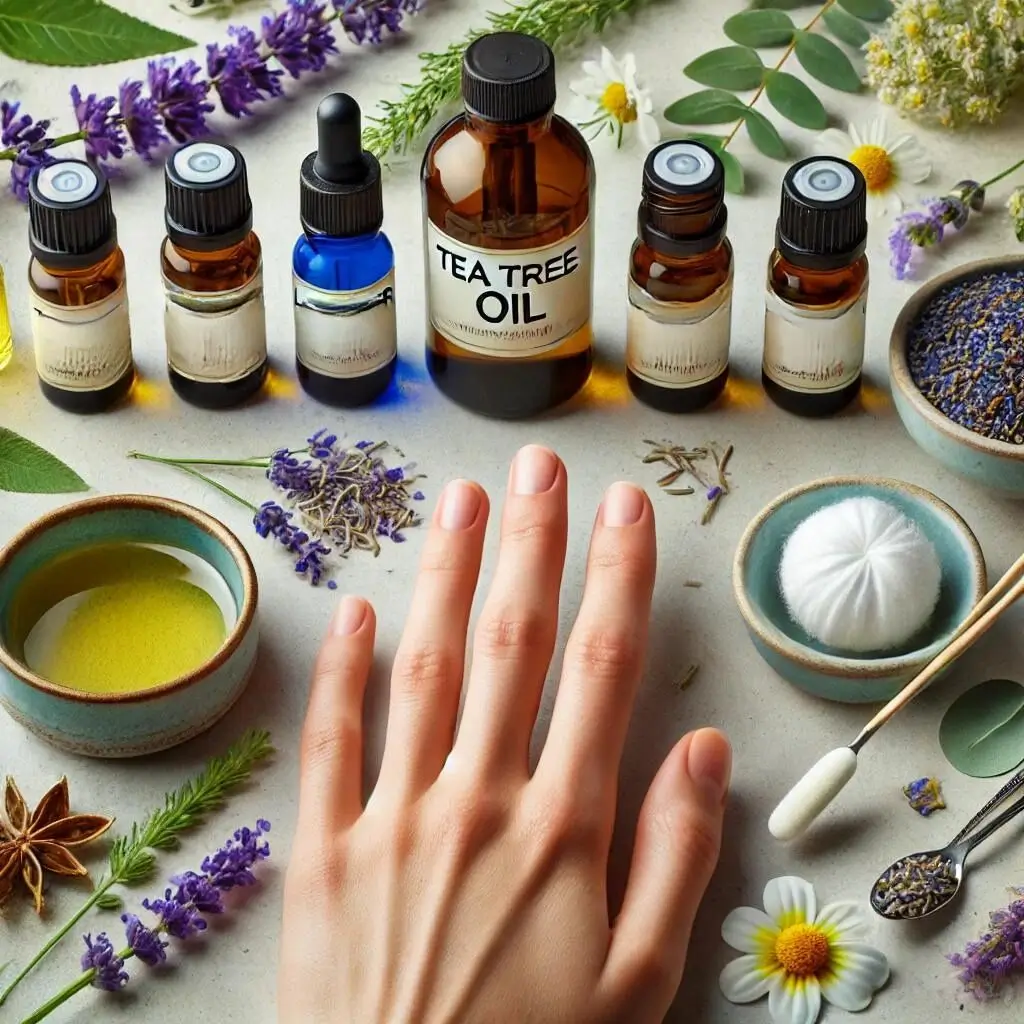An ingrown fingernail can be painful and frustrating, but essential oils offer a natural remedy to alleviate discomfort and promote healing. Essential oils have been used for centuries for their medicinal properties, and their application in treating ingrown fingernails is both effective and soothing. This guide explores the benefits, methods, and precautions of using essential oils for ingrown fingernails, helping you maintain healthy and pain-free nails.
What are the benefits of using essential oils for an ingrown fingernail?
Essential oils provide numerous benefits for treating an ingrown fingernail. They are natural, safe, and can effectively reduce pain and inflammation. Here are some of the key benefits:
- Anti-inflammatory properties: Essential oils like tea tree and lavender can reduce swelling and inflammation around the ingrown nail.
- Antibacterial effects: Oils such as eucalyptus and oregano have strong antibacterial properties that can prevent and treat infections.
- Pain relief: Peppermint oil has a cooling effect that can alleviate pain.
- Promotes healing: Essential oils like frankincense and chamomile can promote faster healing of the affected area.
- Moisturizing: Oils help to keep the skin around the nail hydrated, reducing the risk of further irritation.
- Natural solution: Essential oils provide a chemical-free alternative to traditional medications.

Table: Benefits of Essential Oils for Ingrown Fingernail
| Essential Oil | Benefit |
|---|---|
| Tea Tree | Anti-inflammatory, antibacterial |
| Lavender | Anti-inflammatory, soothing |
| Eucalyptus | Antibacterial, pain relief |
| Peppermint | Pain relief, cooling effect |
| Frankincense | Promotes healing, anti-inflammatory |
| Chamomile | Soothing, promotes healing |
How do you apply essential oils to an ingrown fingernail?
Applying essential oils to an ingrown fingernail is straightforward but requires careful attention to ensure effectiveness and safety. Follow these steps for proper application:
- Clean the area: Wash your hands and the affected finger with mild soap and water. Pat dry with a clean towel.
- Dilute the oil: Essential oils should be diluted with a carrier oil such as coconut, olive, or jojoba oil. A common ratio is 3-5 drops of essential oil per tablespoon of carrier oil.
- Apply the mixture: Using a cotton swab or clean fingertip, apply the diluted essential oil mixture to the affected area. Gently massage it into the skin around the nail.
- Cover the nail: If possible, cover the nail with a bandage to keep the oil in place and prevent contamination.
- Repeat the process: Apply the oil mixture 2-3 times a day until the ingrown nail heals.
List: Steps for Applying Essential Oils
- Clean the area
- Dilute the oil
- Apply the mixture
- Cover the nail
- Repeat the process
Which essential oils are best for treating an ingrown fingernail?
Certain essential oils are particularly effective for treating ingrown fingernails due to their specific properties. Here are the top essential oils recommended for this purpose:
- Tea Tree Oil: Known for its powerful antibacterial and anti-inflammatory properties, it helps reduce infection and swelling.
- Lavender Oil: Its soothing and healing properties make it ideal for reducing pain and promoting recovery.
- Eucalyptus Oil: Effective for its antibacterial and pain-relieving qualities, it can help keep the area clean and reduce discomfort.
- Peppermint Oil: Provides a cooling sensation that alleviates pain and reduces inflammation.
- Frankincense Oil: Known for its ability to promote healing and reduce inflammation.
- Chamomile Oil: Its soothing properties make it excellent for calming irritated skin and promoting healing.
Table: Best Essential Oils for Ingrown Fingernails
| Essential Oil | Key Properties |
|---|---|
| Tea Tree | Antibacterial, anti-inflammatory |
| Lavender | Soothing, healing |
| Eucalyptus | Antibacterial, pain relief |
| Peppermint | Cooling, anti-inflammatory |
| Frankincense | Healing, anti-inflammatory |
| Chamomile | Soothing, healing |
Can essential oils prevent ingrown fingernails?
Yes, essential oils can help prevent ingrown fingernails by maintaining healthy nail and skin conditions. Regular use of certain essential oils can keep your nails and the surrounding skin healthy, reducing the likelihood of developing ingrown nails. Here’s how they help:
- Moisturizing the cuticles: Essential oils like lavender and chamomile keep the cuticles and surrounding skin hydrated, preventing dryness and cracking.
- Strengthening the nails: Oils such as frankincense and tea tree promote stronger nail growth, reducing the chances of the nail growing inward.
- Anti-inflammatory effects: Regular application of anti-inflammatory oils can reduce swelling and inflammation, creating a healthier environment for nail growth.
- Antibacterial properties: Keeping the nail area free from bacteria with oils like eucalyptus can prevent infections that might contribute to ingrown nails.
List: Preventive Benefits of Essential Oils
- Moisturize cuticles
- Strengthen nails
- Reduce inflammation
- Prevent bacterial infections
What precautions should be taken when using essential oils for ingrown fingernails?
While essential oils are generally safe, it’s important to take certain precautions to avoid adverse reactions:
- Patch test: Always perform a patch test on a small area of skin before applying the oil to the ingrown nail to ensure no allergic reaction.
- Dilution: Essential oils should be diluted with a carrier oil to prevent skin irritation.
- Avoid ingestion: Do not ingest essential oils as they can be toxic if swallowed.
- Proper storage: Store essential oils in a cool, dark place to maintain their potency.
- Consult a professional: If you have any underlying health conditions or are pregnant, consult a healthcare professional before using essential oils.
Table: Precautions for Using Essential Oils
| Precaution | Description |
|---|---|
| Patch test | Test on a small skin area for reactions |
| Dilution | Mix with carrier oil to avoid irritation |
| Avoid ingestion | Do not swallow essential oils |
| Proper storage | Store in a cool, dark place |
| Consult professional | Seek advice if pregnant or have health conditions |
How often should you use essential oils on an ingrown fingernail?
The frequency of using essential oils on an ingrown fingernail depends on the severity of the condition and the type of oil used. Generally, it is safe to apply essential oils 2-3 times a day. Here’s a suggested routine:
- Morning application: After your morning shower, clean the affected area and apply the diluted essential oil mixture.
- Midday application: Reapply the oil mixture in the middle of the day to maintain its effects.
- Evening application: Before bed, clean the area again and apply the oil mixture to promote overnight healing.
List: Daily Routine for Essential Oil Application
- Morning: Clean and apply
- Midday: Reapply
- Evening: Clean and apply
What other natural remedies can be used alongside essential oils for ingrown fingernails?
Combining essential oils with other natural remedies can enhance their effectiveness in treating ingrown fingernails. Here are some additional remedies:
- Warm water soak: Soak your finger in warm water with a few drops of essential oil to soften the skin and reduce swelling.
- Epsom salt: Add Epsom salt to the warm water soak for added anti-inflammatory benefits.
- Aloe vera: Apply aloe vera gel to the affected area to soothe and promote healing.
- Apple cider vinegar: Use diluted apple cider vinegar as a soak to help reduce infection and inflammation.
- Hydrogen peroxide: Clean the area with diluted hydrogen peroxide to prevent infection before applying essential oils.
Table: Natural Remedies for Ingrown Fingernails
| Remedy | Benefit |
|---|---|
| Warm water soak | Softens skin, reduces swelling |
| Epsom salt | Anti-inflammatory |
| Aloe vera | Soothes, promotes healing |
| Apple cider vinegar | Reduces infection, inflammation |
| Hydrogen peroxide | Prevents infection |
Are there any side effects of using essential oils on ingrown fingernails?
While essential oils are generally safe when used properly, they can sometimes cause side effects. Here are some potential side effects to be aware of:
- Skin irritation: Undiluted essential oils or those used in high concentrations can cause skin irritation or allergic reactions.
- Photosensitivity: Some oils, like citrus oils, can make the skin more sensitive to sunlight, leading to sunburn or rashes.
- Toxicity: Ingesting essential oils can be toxic and should be avoided.
- Interaction with medications: Essential oils may interact with certain medications, so it’s important to consult a healthcare provider if you are on any medication.
Table: Potential Side Effects of Essential Oils
| Side Effect | Description |
|---|---|
| Skin irritation | Redness, itching, rash |
| Photosensitivity | Increased sun sensitivity |
| Toxicity | Harmful if ingested |
| Medication interaction | Possible drug interactions |
Can essential oils be used on children’s ingrown fingernails?
Essential oils can be used on children’s ingrown fingernails with caution. Here are some guidelines for safe use:
- Dilute properly: Use a higher dilution rate for children, typically 1-2 drops of essential oil per tablespoon of carrier oil.
- Choose gentle oils: Opt for milder essential oils like lavender and chamomile, which are safer for children.
- Patch test: Always perform a patch test on a small area of the child’s skin before full application.
- Avoid certain oils: Do not use strong or harsh oils like eucalyptus or peppermint on young children.
- Supervise application: Ensure an adult applies the oils and monitors for any adverse reactions.
List: Guidelines for Using Essential Oils on Children
- Proper dilution
- Use gentle oils
- Perform a patch test
- Avoid strong oils
- Supervise application
What are the best practices for maintaining healthy fingernails with essential oils?
Maintaining healthy fingernails involves regular care and the use of essential oils. Here are some best practices:
- Regular moisturizing: Use a diluted mixture of essential oils and carrier oil to keep the nails and cuticles moisturized.
- Proper nail trimming: Trim nails straight across and avoid cutting them too short to prevent ingrown nails.
- Gentle nail care: Avoid harsh chemicals and excessive filing.
- Balanced diet: Maintain a healthy diet rich in vitamins and minerals that support nail health.
- Hydration: Drink plenty of water to keep nails hydrated from within.
- Protective gloves: Wear gloves when doing household chores to protect nails from damage.
Table: Best Practices for Healthy Nails
| Practice | Description |
|---|---|
| Regular moisturizing | Use essential oils and carrier oils |
| Proper trimming | Trim nails straight across |
| Gentle care | Avoid harsh chemicals |
| Balanced diet | Eat vitamins and minerals |
| Hydration | Drink plenty of water |
| Protective gloves | Wear during chores |
Conclusion
Using essential oils for ingrown fingernails can provide natural relief and promote healing. With their anti-inflammatory, antibacterial, and soothing properties, essential oils offer a safe and effective solution. Remember to dilute the oils, apply them correctly, and take necessary precautions to avoid adverse reactions. By integrating essential oils into your nail care routine, you can maintain healthy and pain-free nails.
